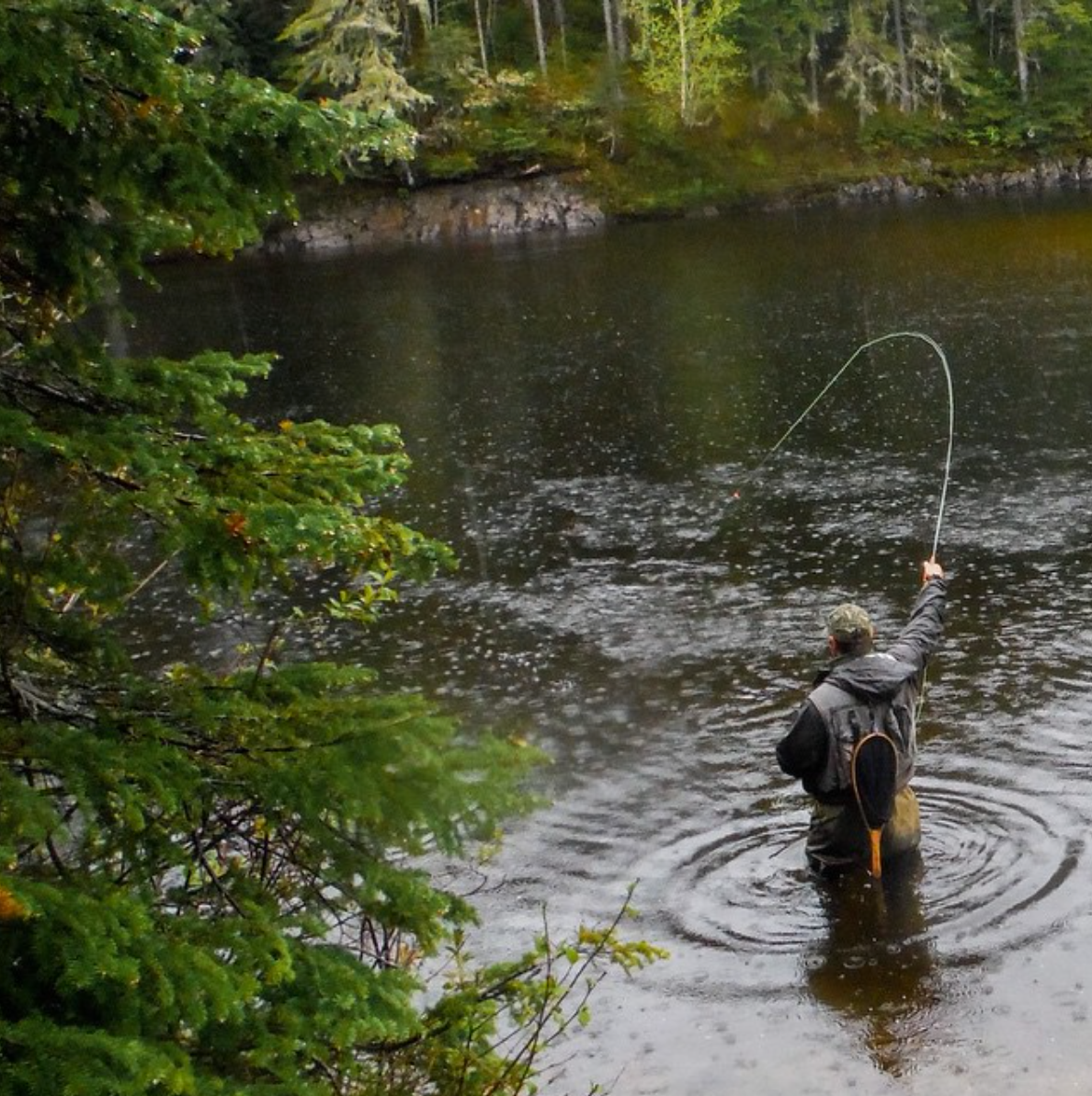
A Dying Art Within Maine
I'm 27, born and raised in Maine, have been fishing my entire life and fly fishing for over a decade. Once I picked up a fly rod, I instantly was tantalized by the difficulty required to do something that was so simple. Catch fish. I became obsessed, tying my own flies, making my own rods, climbing the furthest reaches of headwater streams to find native trout. Now, in the process of becoming a guide, starting my own fly fishing related company (Maine Fly Guys), I find myself wondering, where are my friends? Where are my peers?
I bring the occasional friend to fish and might know one or two people who I can rely on to regularly come along, but most are not obsessed. They are not kept up at night. They do not dream of the next dry fly sip or fear missing giants of the deep. Why? As I study the past and talk to my angling elders, it appears that a good number of people were obsessed with fly fishing. Were fishing opportunities more prevalent? Have we become lazy as a generation and don't want to master a difficult task? Was there a deeper connection to the outdoors? Has technology created a divide between us and nature? How does something, seemingly so popular, disappear? Whatever the cause, there currently exists a decrease in extreme interest in fly fishing in Maine for younger generations.
To find great trout fishing in 1960, you didn't have to travel far, regardless of where you lived. In 2018, to find great trout waters, you may need to travel several hours, particularly if you live in Southern Maine. However, there are supplemental opportunities throughout the year, just follow the stocking truck. Stocking opportunities aren't as glorious as major trout streams of the North, but still, they are unique and locally present. There are opportunities close to home, regardless of location, so that can't be the reason for the decline in interest.
Could it be, that my generation is just lazy? Most of my elders would say so, but I know that I am not lazy. I see my friends working extremely hard to pay off student loans, start families, and pay ridiculous amounts for a small piece of property. All signs of a hard working generation. There is just no way that the youth is lazy and that is the reason fly fishing is fading in popularity. Although laziness is an easy cop-out, it is not the right one.

I'm 27, born and raised in Maine, have been fishing my entire life and fly fishing for over a decade. Once I picked up a fly rod, I instantly was tantalized by the difficulty required to do something that was so simple. Catch fish. I became obsessed, tying my own flies, making my own rods, climbing the furthest reaches of headwater streams to find native trout. Now, in the process of becoming a guide, starting my own fly fishing related company (@MaineFlyGuys), I find myself wondering, where are my friends? Where are my peers?
I bring the occasional friend to fish and might know one or two people who I can rely on to regularly come along, but most are not obsessed. They are not kept up at night. They do not dream of the next dry fly sip or fear missing giants of the deep. Why? As I study the past and talk to my angling elders, it appears that a good number of people were obsessed with fly fishing. Were fishing opportunities more prevalent? Have we become lazy as a generation and don't want to master a difficult task? Was there a deeper connection to the outdoors? Has technology created a divide between us and nature? How does something, seemingly so popular, disappear? Whatever the cause, there currently exists a decrease in extreme interest in fly fishing in Maine for younger generations.
To find great trout fishing in 1960, you didn't have to travel far, regardless of where you lived. In 2018, to find great trout waters, you may need to travel several hours, particularly if you live in Southern Maine. However, there are supplemental opportunities throughout the year, just follow the stocking truck. Stocking opportunities aren't as glorious as major trout streams of the North, but still, they are unique and locally present. There are opportunities close to home, regardless of location, so that can't be the reason for the decline in interest.
Could it be, that my generation is just lazy? Most of my elders would say so, but I know that I am not lazy. I see my friends working extremely hard to pay off student loans, start families, and pay ridiculous amounts for a small piece of property. All signs of a hard working generation. There is just no way that the youth is lazy and that is the reason fly fishing is fading in popularity. Although laziness is an easy cop-out, it is not the right one.
The deeper connection to nature has inexplicably escaped my generation. A large contributor to the breakup between people born after 1990 and the woods, is technological advancements. I have an iPhone, I'm writing this article on my Mac laptop, and have all the technological pieces that a person of my age would likely have. However, I can dissociate, and do on almost a daily basis, from technology and find tranquility in water and on land. As Izaak Walton knew in the 1800's ," God never did make a more calm, quiet, innocent recreation than angling." I believe that my generation perceives fly fishing as a means to catching fish and it is anything but that. The misperception of fly fishing is being driven by the endless Instagram, Facebook, and Twitter posts of people glorifying their "once in a life time" catches. What about the journey? If my generation continues to misperceive what the essence of fly fishing is, I fear the perspicuity of what fly fishing is, along with its popularity, will be forever lost.
How can this divide be reconstructed? Growing up, I was helped at almost every stage of life or, so it felt. The level of aid received at every step for kids today is twofold compared to my childhood. However, I had no fly fishing instruction, no advisor telling me what to do or how to do it. As Ted Leeson says, "There are a lot of advantages to being self-taught. Quality of instruction is not one of them." Learning through experience is unique and can't be replicated. In order to restore the interest within the art of fly fishing, it is up to my generation to introduce and allow future generations to learn on their own. Half the fun of fly fishing is observing, failing, adjusting, and succeeding. If you remove the failure, how will anyone become hooked?
The deeper connection to nature has inexplicably escaped my generation. A large contributor to the breakup between people born after 1990 and the woods, is technological advancements. I have an iPhone, I'm writing this article on my Mac laptop, and have all the technological pieces that a person of my age would likely have. However, I can dissociate, and do on almost a daily basis, from technology and find tranquility in water and on land. As Izaak Walton knew in the 1800's ," God never did make a more calm, quiet, innocent recreation than angling." I believe that my generation perceives fly fishing as a means to catching fish and it is anything but that. The misperception of fly fishing is being driven by the endless Instagram, Facebook, and Twitter posts of people glorifying their "once in a life time" catches. What about the journey? If my generation continues to misperceive what the essence of fly fishing is, I fear the perspicuity of what fly fishing is, along with its popularity, will be forever lost.
How can this divide be reconstructed? Growing up, I was helped at almost every stage of life or, so it felt. The level of aid received at every step for kids today is twofold compared to my childhood. However, I had no fly fishing instruction, no advisor telling me what to do or how to do it. As Ted Leeson says, "There are a lot of advantages to being self-taught. Quality of instruction is not one of them." Learning through experience is unique and can't be replicated. In order to restore the interest within the art of fly fishing, it is up to my generation to introduce and allow future generations to learn on their own. Half the fun of fly fishing is observing, failing, adjusting, and succeeding. If you remove the failure, how will anyone become hooked?
